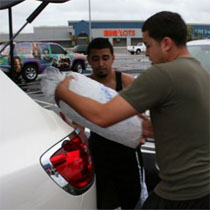It started with a plan for transition to those displaced by Hurricane Katrina. It ended with a proposal for temporary housing for disaster victims that should motivate people to put their own plans in place. The federal government plans to donate approximately 1,800 mobile homes to 3,400 families living in those homes since they were displaced by Katrina. The government also plans to distribute $50 million in rental vouchers to low-income trailer residents to move into targeted housing projects and will assume from the State of Louisiana the responsibility of helping those people secure permanent housing. Excess trailer homes from FEMA’s inventory (the Federal Emergency Management Agency) will be donated to state and local governments and nonprofit groups.
These actions are motivated by a desire to provide a more humane transition to more vulnerable populations that were facing FEMA’s threatened eviction action after the trailer program ended on May 1, 2009. FEMA’s housing assistance program typically provides support for 18 months. In the case of Hurricane Katrina, FEMA extended assistance for 45 months. Since many local jurisdictions in the Gulf Coast will not change their zoning ordinances to allow trailer homes, this initiative may be of limited benefit.
Meanwhile, FEMA officials told the Associated Press that they are evaluating options to house Florida hurricane evacuees in foreclosed homes should a severe storm exhaust the availability of all other housing options. This proposal is motivated by concern to stabilize disaster-affected communities rather than having evacuees disperse across the country and possibly not return, which was the experience of Louisiana in the aftermath of Katrina. Given the legal issues involved in determining ownership and rights to a foreclosed property and the uncertainty around the condition of the properties, this seems an unattractive option. Foreclosed homes are generally not maintained and lacking basic utilities. Residents of hurricane-exposed communities should begin to put their own plans in place.


